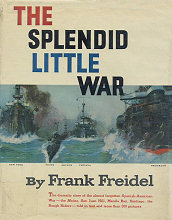
FREIDEL : The splendid little war (fülszöveg)
"It has been a splendid little war," wrote John Hay to Theodore Roosevelt after the fall of Santiago. Little, the Spanish-American War was; it was over in barely four months. Splendid? Perhaps for those at home, reading the blazing headlines about a war which, in its ineptitudes, its phenomenally lucky victories, its ironies, often resembled a comic opera. But for the men who fought in it, all during that hot and terrible summer, it was as bloody, dirty and heroic a war as any in history.
This is their story, told in large measure in the words of those who were there at the time: the men who did the fighting and the famous correspondents who wrote about it. Told, too, in more than three hundred photographs and line drawings made on the spot by noted artists—Frederic Remington, Howard Chandler Christy, William J. Glackens, among others.
Frank Freidel, author of the definitive biography of Franklin D. Roosevelt and professor of history at Harvard, has combined pictures and text in a thrilling documentary of the war which began as a crusade, stirring the hearts of the men who rushed to enlist in it. and lost its innocence some place in the mud, the deaths and the disillusionments between Santiago and the Philippines.
Here are the men who recorded it, day by day and hour by hour. Teddy Roosevelt, the indomitable leader of the Rough Riders, impatient, energetic, chafing at delay: leading his command into enemy lines without looking back to see if he were being followed. Stephen Crane, author of The Red Badge of Courage, parading up and down the embankments on San Juan Hill in full sight of the Spanish riflemen, dressed conspicuously in a white raincoat; or, in a more somber mood, writing of the death of a friend in the muddy night nearby ("He was dying hard. Hard. It took him a long time to die"). Richard Harding Davis, the most famous war correspondent of his day, describing the weird moonlit landing in the surf at Daiquiri or the ominous sea of mist that made the sleeping soldiers, before the twin battles of El Caney and San Juan, look like drowned men.
And here, recorded not as they appear in history, but in the words of stark reality that came from the men who fought in them, are the battles themselves. Dewey's famous triumph over the Spanish fleet in Manila Bay, accomplished by men stripped down to their drawers and shoes as they fired, in the terrible heat, on ships whose movements were "flourishes of desperation inspired by defeat." The unforgettable battle of San Juan Hill—not the graceful assault that it became in legend, but the fierce struggle that made Stephen Crane cry out exultantly, "Yes, they were going up the hill, up the hill. It was the best moment of anybody's life."
The grimmest battles of the war were not these, however. The deadliest encounters were fought with subtler enemies: the heat, the torrential rains, the lack of food and shelter, the scarcity of medicine and the suffering of the wounded. They were fought in the marshy swamps which bred typhoid fever, dysentery, malaria and, the most dreaded killer of all, yellow fever, which took the lives of almost as many men as died in the actual fighting.
THE SPLENDID LITTLE WAR is the recording of an exciting, colorful and often tragic event. The conflict it describes was distinguished by heroism on both sides, and it was perhaps the last war to be fought according to the standards of military chivalry. If there was indeed splendor in the Spanish-American War, it was in the gallantry and self-sacrifice displayed by the men who fought in it; Professor Freidel's book is an enduring tribute to those forgotten heroes.